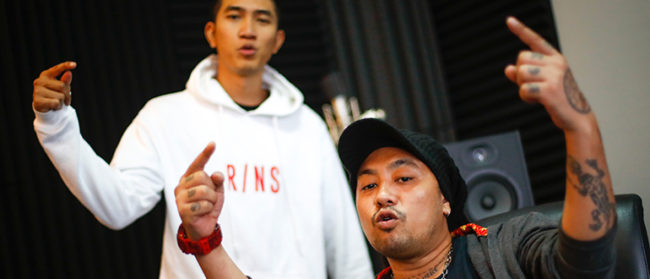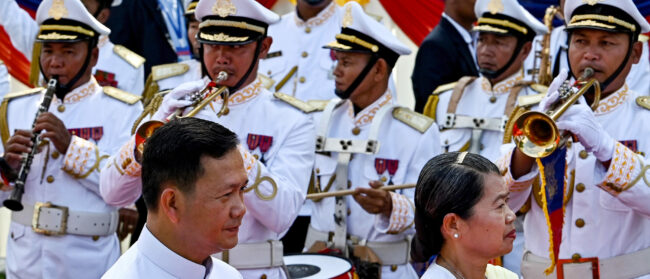Cambodian politics is at a stalemate. By threatening a suspension of trade preferences granted under its “Everything But Arms” (EBA) scheme, the European Union has sent a strong message opposing the authoritarian trend in Cambodia. Recent announcements by the Cambodian government to ease tensions with the dissolved main opposition party appear to be a hopeful response. In practice, though, a settlement is not on the horizon, as it would demand fundamental changes to the Kingdom’s political landscape. Instead, the shattered relationship between the political rivals Hun Sen and Sam Rainsy suggests a lasting gridlock in domestic Cambodian politics.
Even if the now-defunct Cambodia National Rescue Party (CNRP) and the vast majority of their representatives were allowed to resume political activities, the party would only legitimise the fait accompli set by the regime since the CNRP’s dissolution. Consequently, the CNRP runs the risk of joining a further episode in the cynical game of cat-and-mouse unless the party is successful in reinstating the status quo ante before it was dissolved. This includes free and fair elections of the National Assembly within six months after the CNRP resumes operations, the reinstatement of their 5,007 commune councillors and the annulment of indirect Senate elections that took place earlier this year. All charges against opposition politicians and the five-year political ban for 118 of them must be dropped immediately. Finally, the opposition needs safeguards for the upcoming election campaign and its further existence in general. As the ruling Cambodian People’s Party (CPP) appears neither able nor willing to provide any such guarantee, international mediation appears more necessary than ever. Legally, an additional protocol to the 1991 Paris Peace Accords, supposed to end Cambodia’s civil war and to introduce a liberal democracy, would constitute an appropriate and sufficient foundation.

To clarify, these are only the minimum conditions on which the CNRP must insist. If not, it seems obvious what is going to happen over the next few years: the opposition will struggle to revive itself while grappling with immense internal rifts within the party. If it can overcome the conflicts of its two competing factions represented by Kem Sokha and Sam Rainsy, the CNRP could be capable of regaining its popularity – that is, until the next commune and parliamentary elections in 2020 and 2022, respectively. Then, repression will likely increase again with the sole purpose of avoiding any change in government, and the CNRP will find itself in a very similar situation as it finds itself now. In the words of Marx, history will repeat itself as farce.
I am quite sure that it is still too early for Cambodia’s leading politicians to escape from this gridlock. It is the decades-long rivalry between Hun Sen and Sam Rainsy that prevents any reconciliation between their parties. As opposition leader, Rainsy even survived an attempt on his life causing more than a dozen fatalities in 1997. It is his personal tragedy that he has only ever been allowed by Hun Sen to simulate an opposition; whenever he has grown into a real challenger – as would be normal in a stable democracy – he was excluded from the political game. Currently, it is his fourth involuntary absence from Cambodia after he entered politics in the early 1990s. Nobody should expect that he will be able to return freely while Hun Sen is alive.
Apparently, Sam Rainsy still completely rules out his ultimate withdrawal from politics. Based on his enduring popularity in Cambodia he is convinced that he is the CNRP, irrespective of his main residence in the 16th Arrondissement of Paris which is in every sense far removed from Cambodia. With the EU’s effective pressure, Rainsy apparently decided that it was necessary to become acting president of his dissolved party. Judging by the strong objection of Kem Sokha’s daughters immediately after the announcement, it is obvious that this move was not arranged by the two co-leaders. Therefore, Rainsy’s appointment was little more than a one-sided dilettantish action in a power struggle over which distrust between the factions of Rainsy and Sokha looms larger than ever. Now, the CNRP is paying a high price for its leaders having failed to establish professional party structures. It is still dominated by two entourages focused solely on their headmen, who rule through a personalised leadership style instead of democratic participation opportunities within the party. With such internal chaos, I wonder how Rainsy could ever lead a stable government.
Certainly, the minimum conditions I described earlier require concessions by the opposition. Permanently abroad, Sam Rainsy’s resignation should no longer be taboo, as it could ease tensions towards Hun Sen and within the CNRP. Such an unsatisfactory end to his career would be a high price indeed, but could begin real political change within both his party and in his country. But the clock is ticking. No later than February, the European Commission will decide whether to initiate the process to suspend the EBA agreement or not. To stop the worst scenario already in its earliest stage, the Cambodian government needs to take reliable steps towards democracy. Maybe it is this very short period that increases the probability for a political settlement as it impedes tactical games. While the EU is well advised to keep all options open including, if necessary, mediating between the opposition and the government, at the end of day Hun Sen has to calculate which cost is higher: allowing the CNRP to return, or losing access to the EBA – and the potential economic disadvantages that could bring.
Dr Markus Karbaum is a political scientist and independent consultant specialising in Cambodian politics.


